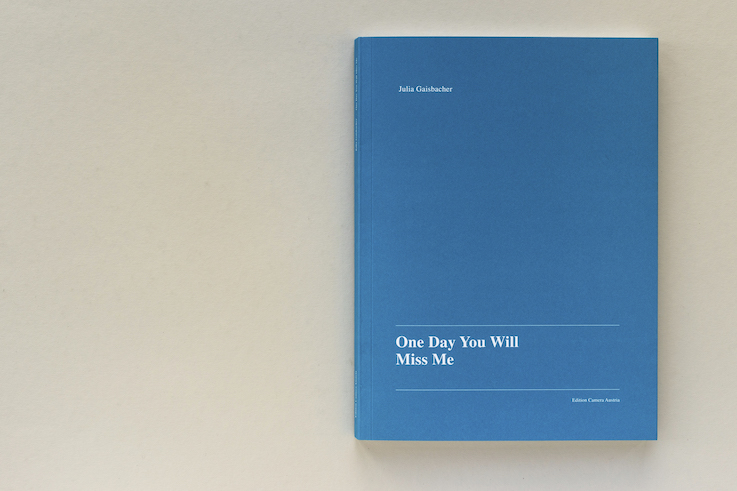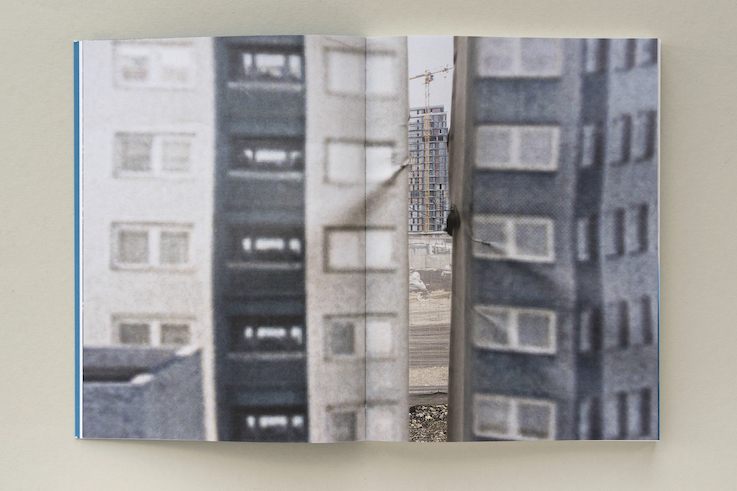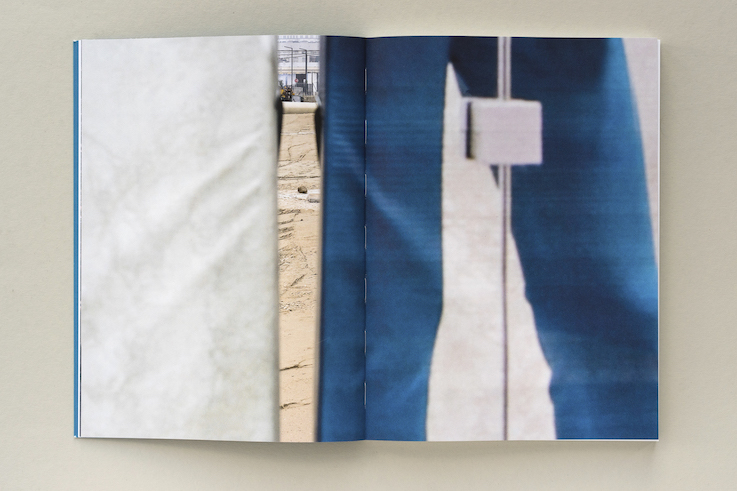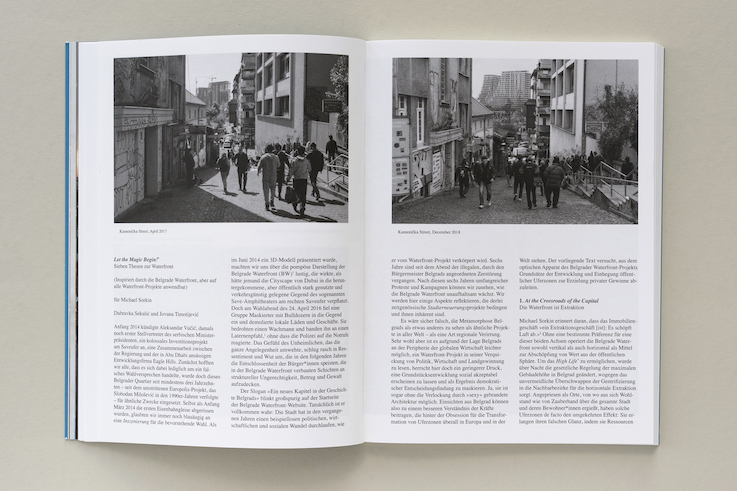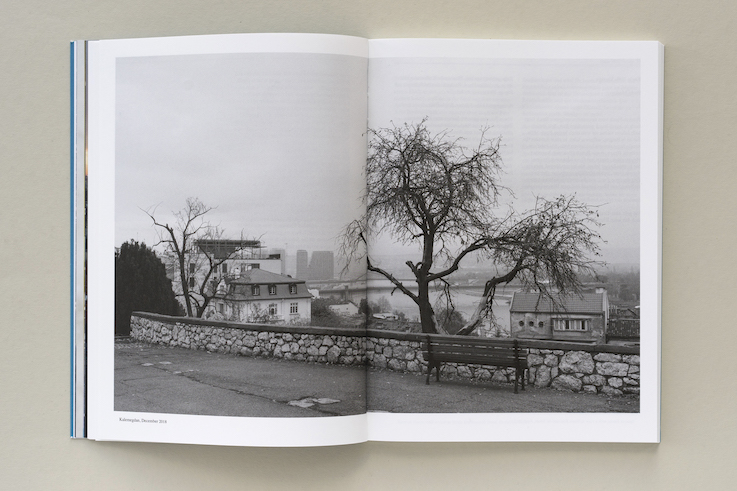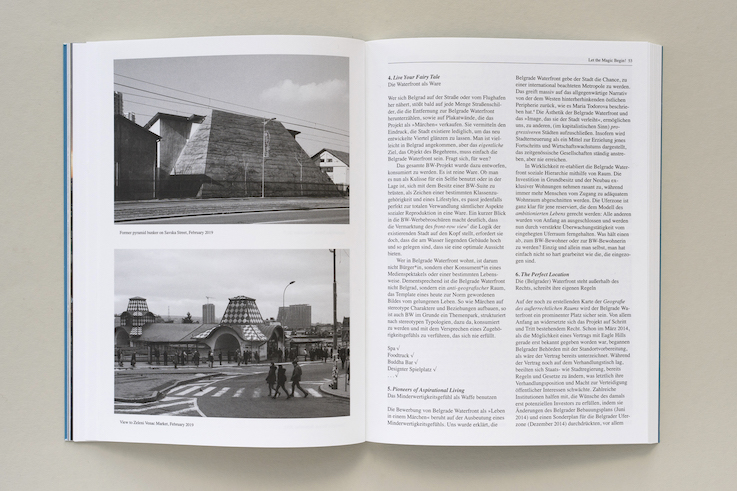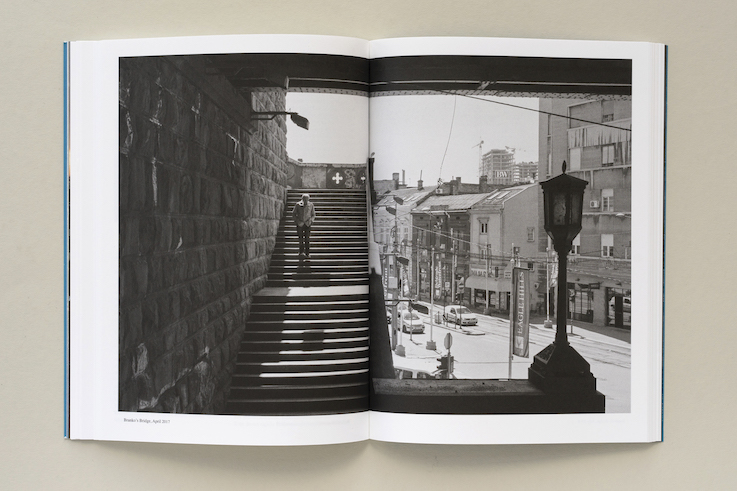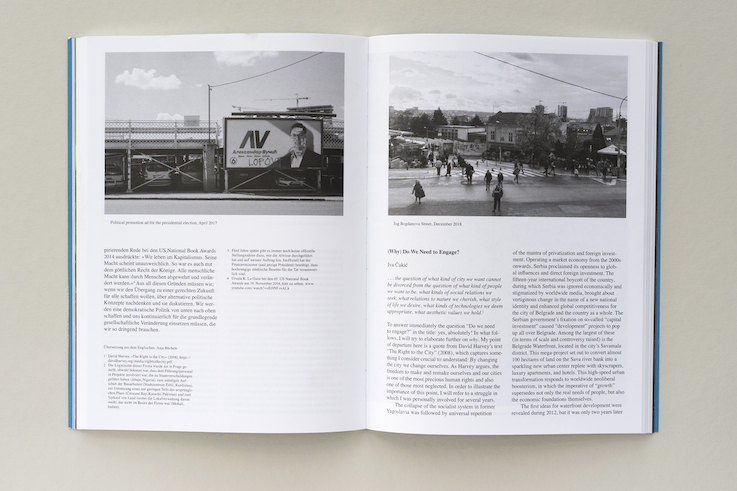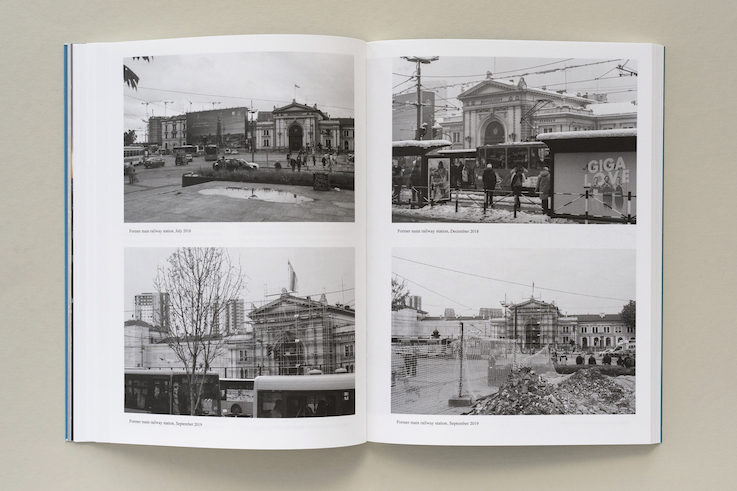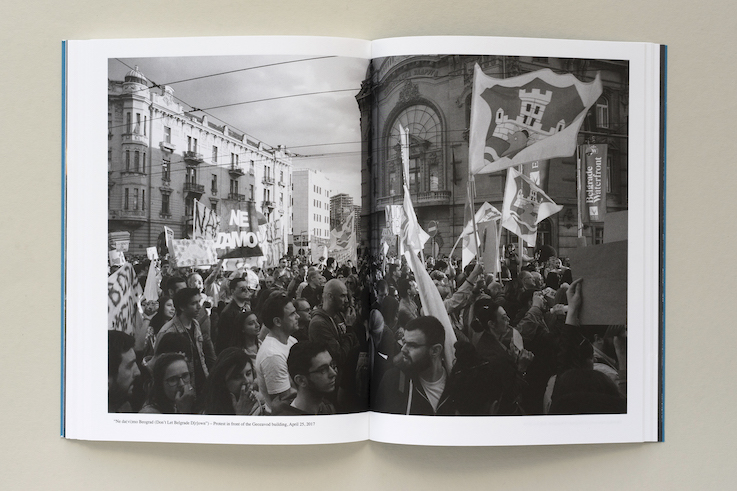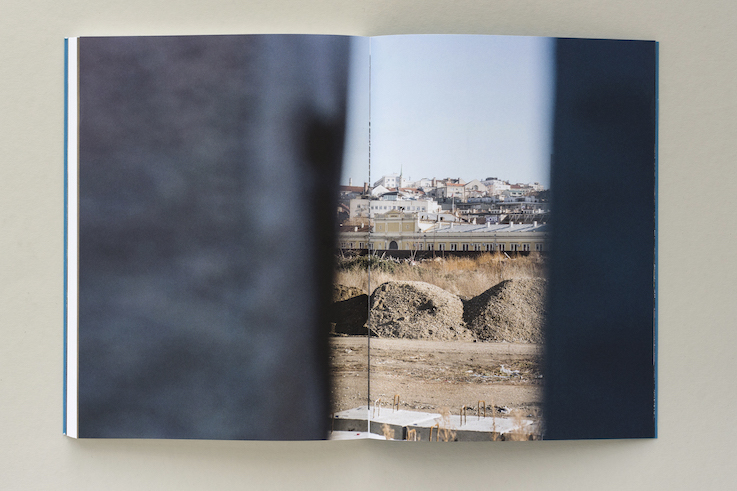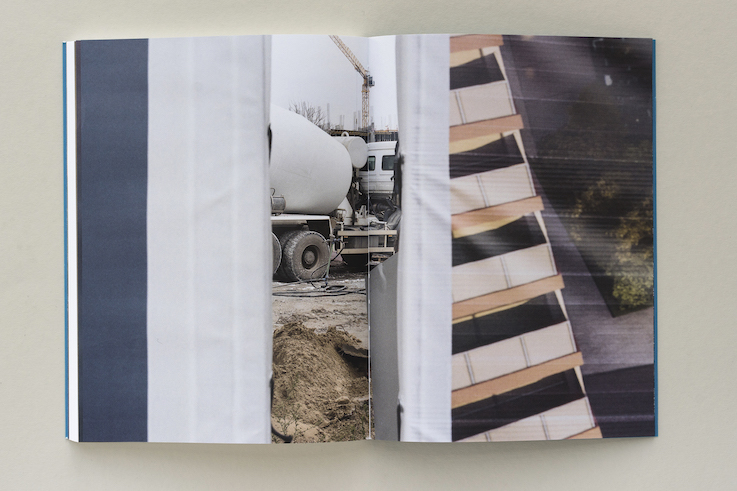Press information
Julia Gaisbacher: One Day You Will Miss Me
Infos
Ed. by Reinhard Braun.
With contributions by Elke Krasny, Barbi Marković, Dubravka Sekulić / Jovana Timotijević, Iva Čukić, and Reinhard Braun (ger./eng.).
Image sequence by Alejandro Cartagena. Edition Camera Austria, Graz 2021.
160 pages, 19 × 25.4 cm, numerous b/w- and color illustrations.
€ 27.– / ISBN 978-3-902911-612
Presentations
18. 9. 2021, Office for Photography, Zagreb
12. 10. 2021, Camera Austria Graz
19. 10. 2021, Goethe-Institut, Belgrad
Press downloads

Press Information
Between 2017 and 2019 Julia Gaisbacher has been documenting and analyzing, in her cross-media cycle One Day You Will Miss Me, the processes of transformation in Belgrade sparked by the massive real-estate project Belgrade Waterfront. Her photographs are at the heart of her spatial surveys and her sociocultural research.
Alongside the comprehensive overview of Julia Gaisbacher’s photographs in the series, the eponymous publication compiles five texts in German and English. Six authors contribute a broad spectrum of perspectives on Gaisbacher’s work: Elke Krasny, professor at the Academy of Fine Arts Vienna, curator, and cultural theorist; Barbi Marković, writer; Dubravka Sekulić, Belgrade architect, teaching as a senior tutor at the Royal College of Art, London; Jovana Timotijević, sociopolitical activist from Belgrade; Iva Čukić, spatial planner and activist from Belgrade; and Reinhard Braun, artistic director of Camera Austria and publisher of the magazine Camera Austria International. The renowned Mexican photographer Alejandro Cartagenaconceptualized the sequence of images.
Change is a characteristic instrinsic to lively urban space. While the urban fabric of historical downtown areas usually grows naturally, real-estate developments like the Belgrade Waterfront intrude in a disruptive way. Funded by Eagle Hills, a globally active group of investors, the project counts among Europe’s biggest and has been transforming the entire urban landscape of Belgrade since 2015. Large-format glass and steel structures contrast with the historically evolved city. At the same time, the construction project dominates everyday life in Belgrade visually, economically, and in terms of urban planning. This has resulted not only in architectural distortion, but also in socioeconomic strain.
In her project, Julia Gaisbacher pursues an ongoing visual documentation and analysis of the Belgrade Waterfront, which she considers to be a perfect example of the many instances of upheaval today. In urban portraits, Gaisbacher has repeatedly captured both the reshaping of Belgrade’s urban fabric and the shifts in architectural style—giving rise to an archive of the slowly changing city.
These explorations have resulted in a series of black-and-white and color photographs focusing on the historical urban landscape of Belgrade. The concrete skeletons of the construction project’s first residential towers have become symbols visible from afar. Although never the focus of the photographs, these high-rises are omnipresent as foreign bodies due to their sheer dimensions and materiality.
At the same time, Julia Gaisbacher took a step closer to the construction project and its everyday impact on the inhabitants of Belgrade. From this perspective she examines the discrepancy between the real-life conditions of many Belgrade residents and the high-gloss subject, along with the strategies used to advertise and market it. Julia Gaisbacher’s observations are readable as a visual metaphor of political developments, but also of urban transformation processes in a global context.
Anna Resch (Translated from German: Dawn Michelle d’Atri)
Julia Gaisbacher, born 1983 in Grambach near Graz (AT), lives and works as a freelance artist and photographer in Vienna (AT). She studied art history at the University of Graz as well as sculpture and three-dimensional design at Dresden University of Fine Arts (DE) and at the LUCA School of Arts, Brussels (BE). Julia Gaisbacher has received various awards, including the State Scholarship for Photography from the Austrian Federal Chancellery (2020), the Prize of the Province of Styria for the Promotion of Contemporary Visual Art (2019), the Erste Bank ExtraVALUE Art Award (2018), and the City of Graz Photo Promotion Award (2016). Moreover, she is currently nominated for a DZ BANK Art Collection scholarship. Julia Gaisbacher has shown parts of One Day You Will Miss Me in the scope of exhibitions at the Goethe-Institut, Belgrade, the Akademie Graz, and at two Vienna venues, MUSA Startgalerie and das weisse haus. Her artwork is presently being shown in three exhibitions: Kunsthaus Graz; Fotohof, Salzburg (online, AT); and Mobiler Pavillon der Steiermark Schau (AT). www.juliagaisbacher.com
Since 2011, Reinhard Braun has been the artistic director of Camera Austria and the publisher of the magazine Camera Austria International. Among his most recent curatorial projects are solo exhibitions with Sophie Thun / Mladen Bizumic, Peggy Buth, and Jochen Lempert (all 2019) and with Isa Rosenberger (2020), as well as the project The City & The Good Life (2020). He serves as the publisher of Edition Camera Austria, most recently releasing Maria Hahnenkamp: What Does Photography Mean Here? (2019) and Isa Rosenberger . . . the vast land from which she comes (2020).
Alejandro Cartagena is an artist, photographer, and bookmaker living in Monterrey (MX). His work focuses on themes of identity, the city, borders, and photographic culture. He has exhibited worldwide and his work is in several private and public collections. He has published many books and has worked with other authors as editor and designer. He regularly teaches and lectures in the Americas and in Europe.
Iva Čukić graduated from the Faculty of Architecture in Belgrade (RS) with a doctoral degree in urban planning. Her areas of interest include urban commons, urban transformation, and self-organization. She is a co-founder of the Ministry of Space collective, formed in 2011 to pursue spatial justice. She was a founder of the Don’t Let Belgrade D(r)own movement, involved in its activity until 2018.
Elke Krasny, PhD, is a professor of art and education at the Academy of Fine Arts Vienna (AT). As a cultural theorist and curator, Krasny explores issues related to social and ecological equality, critical spatial practice, and politics of memory. Her book Stadt und Frauen: Eine andere Topographie von Wien (City and Women: Another Topography of Vienna) makes a decisive contribution to research on urban feminist memory. The exhibition Critical Care: Architecture and Urbanism for a Broken Planet, curated together with Angelika Fitz, introduces a care-based ethical perspective in architectural discourse.
Barbi Marković was born in Belgrade (RS) and studied German language and literature in Belgrade and Vienna (AT). She moved to Vienna in 2006. In 2009 she caused a sensation with the Thomas Bernhard remix novel Ausgehen (Izlaženje, 2006). Short stories, plays, radio plays, and numerous awards followed. Her novel Superheldinnen appeared in 2016. For Superheldinnen she was awarded the Alpha Literature Prize (2016), the Adelbert von Chamisso Prize (2017), the George Saiko Travel Scholarship (2018), and the Reinhard Priessnitz Prize (2019).
Dubravka Sekulić is an architect and educator whose work investigates the transformation of the contemporary city and the relation between law, property and space, with a particular interest in understanding the (built) environment as archive. She is a Senior Tutor at the School of Architecture, Royal College of Art, London (GB), and holds a PhD in architectural history and theory from the Institute for the History and Theory of Architecture (gta), Department of Architecture, ETH Zurich (CH). She regularly publishes and lectures throughout Europe.
Jovana Timotijević is an activist and a researcher in critical urban studies and feminist theory, focusing on emancipatory spatial practices and housing justice. She works as program coordinator of the Ministry of Space collective and as a researcher at the Belgrade (RS) Faculty of Political Sciences.
Images
Publication is permitted exclusively in the context of announcements and reviews related to the exhibition and publication. Please avoid any cropping of the images. Credits to be downloaded from the corresponding link.

